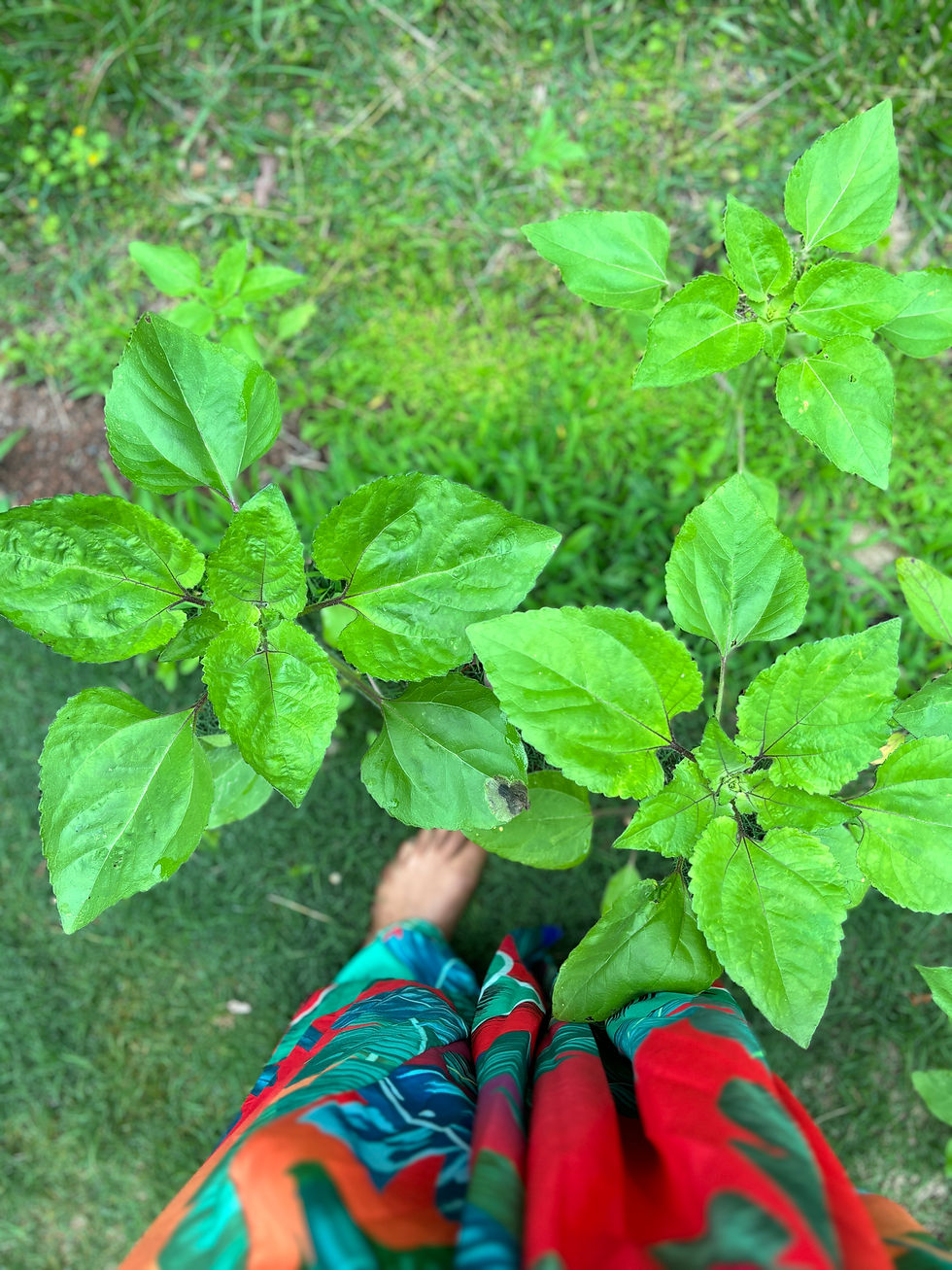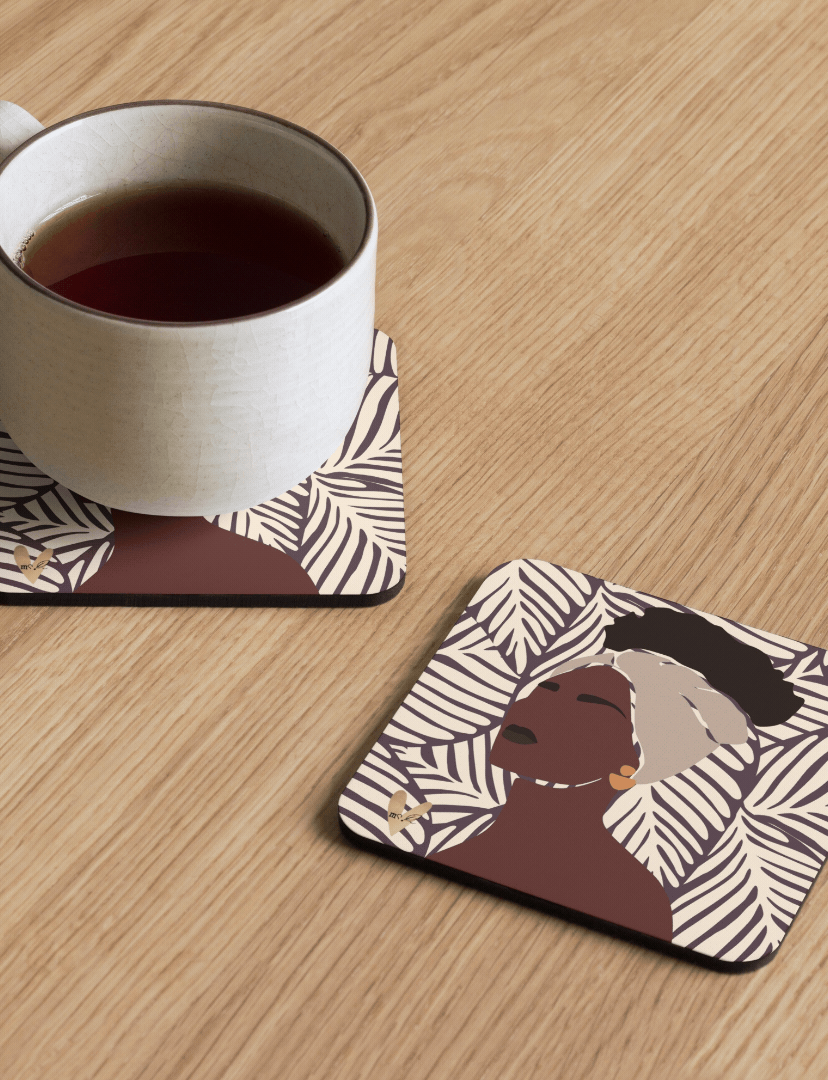Perimenopause Awareness Month: My Journey Through Perimenopause, Soul Care, and The Birth of Mohawkmomma Studio Boutique
- Andrea Angie (GA)

- Sep 2, 2024
- 6 min read
Updated: Feb 4
Along with Self-Care Awareness Month, September is Perimenopause Awareness Month, and I want to shed light on the often-overlooked intersection of neurodivergence and perimenopause.
My Perimenopause Experience - Some Highlights
As a 52-year-old autistic woman mothering neuroatypical children, I'd like to share some of my personal journey through perimenopause and the pivotal role that soul care played in my life during that time and the role it currently plays now that I’ve been postmenopausal since Thanksgiving of 2021.
My peri-experience not only led to profound self-compassion and personal rediscovery, it led me in the creation of Mohawkmomma Studio Boutique at the age of forty-six, five months after giving birth to our ninth (and last child), Emerald Atarah Shalom.
I would not have known I was perimenopausal if it were not for my midwife, who taught me about my body and the changes I was undergoing.
Which is why I created my soul care studio to be a creative, ARTvocacy sanctum dedicated to amplifying peace, play, and social impact through pastoral-artisanal creations, no matter the feminine transitions of life.
As a post-menopausal wombman, I unapologetically brought my friends, family, and customers along on what I call my new embodiment emergence adventure.
I interviewed my mom and asked my Aunties to speak into my life as if I were tending to my life garden and coming of age because, indeed, I was. In my lived experience, communal connection with compassionate + wise elders helps the soul flourish.
Black Women's Health: A Call for Better Care
As a Black autistic woman, navigating perimenopause comes with additional challenges due to the historical dismissal of Black women's health concerns.
Systemic biases + unequal healthcare access can result in delayed diagnoses, inadequate treatment, and an increased risk of health complications.
It's essential that we ARTvocate for better care, awareness, and resources to support Black women through perimenopause and beyond, ensuring our experiences are recognized + validated within the healthcare system.
For me, temperature control, body pain in my left arm, severe acne, increased sassiness, weight gain (Yes, menopause "belly" is normal - our bodies are meant to evolve. How we respond to her is within our control.), memory fog, increased aversion to certain smells, being hugged, fatigue, and BO (body odor) have been my experiences.
Imma keep it real, here’s the thing, during perimenopause, despite best efforts, sniff sniff body odor. But it’s not our fault. I’ll say that again: NOT OUR FAULT. Our hormones are running the show.
Good to know: Hot flashes and night sweats aside, declining estrogen + progesterone also means higher levels of testosterone (produced in small amounts by our ovaries) and cortisol (our stress hormone), both of which have been linked to a stronger body odor.
To address these, I optimized my soul care: I changed my eating regimen (and work with a nutritionist), changed my deodorant to Lume, prayer walks, carefully selecting my medical/somatic support team, incorporated weight-bearing activities and jump rope, bubble breathwork, taking DIM supplements, along with Vitamin D3K2 and B12.
I eliminated alcohol (consider The Mocktail Club, a Black woman-owned, non-alcoholic adaptogenic beverage alternative),
I still take frequent walks in nature and make the most out of lavishing in showers + baths.
I decreased my time online, increased my coloring activities, created an accommodation cheat sheet, engaged in gratitude journaling on sticky notes, and ensured I got more rest. But my husband will attest that none of this helped my sassiness, he says, “Perimenopause gave you a sassiness upgrade.”
Define Perimenopause
Perimenopause is the transition period leading up to menopause. It involves fluctuating hormone levels, resulting in physical, emotional, and neurological changes. Every woman's experience is unique, with varying onset, duration, and symptoms.
Although the average age for perimenopause is in the mid-40s, some women begin experiencing symptoms in their mid-to-late 30s. This transition can last for several years before reaching menopause (average age 51 years), which is officially diagnosed after 12 consecutive months without a menstrual period.
Perimenopause is just another soulful transition to ARTvocate for and accommodate the intrinsic worth of our feminine ebb + flow. We don’t have to accept the symptoms as part of life without proactively seeking solutions + alternatives, especially for any chronic co-occurring conditions.
Often, we hear about symptoms such as irregular periods, mood swings, weight gain, thinning hair, aches, acne, hot flashes, sleep disturbances, and vaginal dryness (to name a few).
Which is why it's important that every little bit you do in your 30s and 40s can improve things for you overall. There's no need to wait for symptoms.
perimenopause is just another soulful transition
It's A Sensory Jungle Out There
During this period, hormonal fluctuations can exacerbate symptoms and pose challenges for individuals dealing with sensory sensitivities, emotional regulation, and other neurological differences.
Navigating life as a mom + CEO with increased sensitivities has led me to amplify various soul care practices + integrate new technologies in my life. I even created a collection to bring awarenesss + soothe the soul, The MenoGarden Soulful Transitions.
For me, humming helps soothe my nervous system. I wear noise-canceling headphones, blue-light-blocking glasses, and shop at Walmart during their sensory-friendly hours from 8 AM to 10 AM.
During these hours, Walmart makes the following changes to create a less stimulating environment for shoppers with sensory processing disorders:
Dims the lights
Turns off the radio
Displays a static image on the walls
This program aims to make shopping more inclusive for people with sensory disabilities, including those with autism, ADHD, dyslexia, or post-traumatic stress disorder.
Although it may only be two hours, it’s a start. Historically, people with sensory processing issues have had to resort to shopping online, wearing headphones in stores, or risking overstimulating triggers that require a recovery period.
Advice for My Premenopausal + Perimenopausal Sistahs
My personal + pastoral advice is to focus on community, online + offline: (I highly recommend the community of Menopause Made Modern, powered by Claret Circle https://menomademodern.com/), self-compassion, and establishing a peri-plan during premenopause. To be clear, perimenopause means “around menopause” while premenopause means “before menopause.”
My transition phase (perimenopause) lasted for 4 years, It surprised me how much of an impact the hormonal changes had on my neurology. Noone was talking about that, so I started observing myself, conducting my own research and seeking out any research addressing it.
Many women face self-blame and shame for not coping better, often due to misdiagnoses or overlooked challenges. Remember, it's not your fault. Say it with me, "I need support + care, not blame + shame."
Women may start to hide or mask their struggles, placing unreasonable expectations on themselves. Learning about neurodiversity can shift your perspective and encourage self-acceptance.
I’m here to tell you that perimenopause will highlight your neurodivergence, whatever it may be as hormonal fluctuations exacerbate symptoms, revealing previously undiagnosed neurological differences.
Neurodivergence refers to the diverse ways in which the human brain functions, including autism, ADHD, dyslexia, PTSD, OCD (Obsessive-Compulsive Disorder), Tourette's syndrome, bipolar disorder, borderline personality disorder, and other neurological or mental health conditions that result in atypical cognitive functioning.
These conditions may impact an individual's sensory processing, social interaction, emotional regulation, learning, and overall life experience.
How Do You Know What’s Perimenopause Symptoms and What’s Not?
Distinguishing perimenopause symptoms from pre-existing sensitivities or health conditions can be challenging. It's crucial to think of yourself more holistically + cyclically.
As perimenopause can lower your coping threshold, understanding your hormone levels is essential, as they impact all aspects of life.
In my journey, I’ve learned to sense God's care for me and the care I offer myself when I replace socially conditioned scrutiny with radical shalom (wholeness, peace, wellbeing), which ultimately fosters a greater sense of self-compassion and patience.
Remember, you are whole. We are whole, embodied beings.
Compartmentalizing ourselves only leads to frustration and distraction from loving + nurturing ourselves, personally + collectively.
Show Hospitality To Your Soulful Transitions
My testimony is a soul care invitation to shepherd you as you embark on a more welcoming journey of self-tending with the mindfully designed collection, Soulful Transitions.
I’ll say it again: perimenopause is just another soulful transition to ARTvocate for and accommodate the intrinsic worth of our feminine ebb + flow.
Download Your Free Tracking My Cycle SOULution Toolkit
A Perimenopause Soul Care Gift Set Peek
Until next time,
Scribble. Speak. From your soul.
Discover the 'Soulful Transitions: MenoGarden Musings' collection and much more in the soul care boutique + be inspired to amplify your ARTvocacy through peace + play vibes!
Disclaimer: This blog post is for informational purposes only as I share my pastoral care, my personal journey, and bring to you valuable research, it is not intended to be a substitute for professional medical advice, diagnosis, or treatment. If you are experiencing any medical concerns or symptoms, please seek the guidance of a qualified healthcare professional.


.png)












